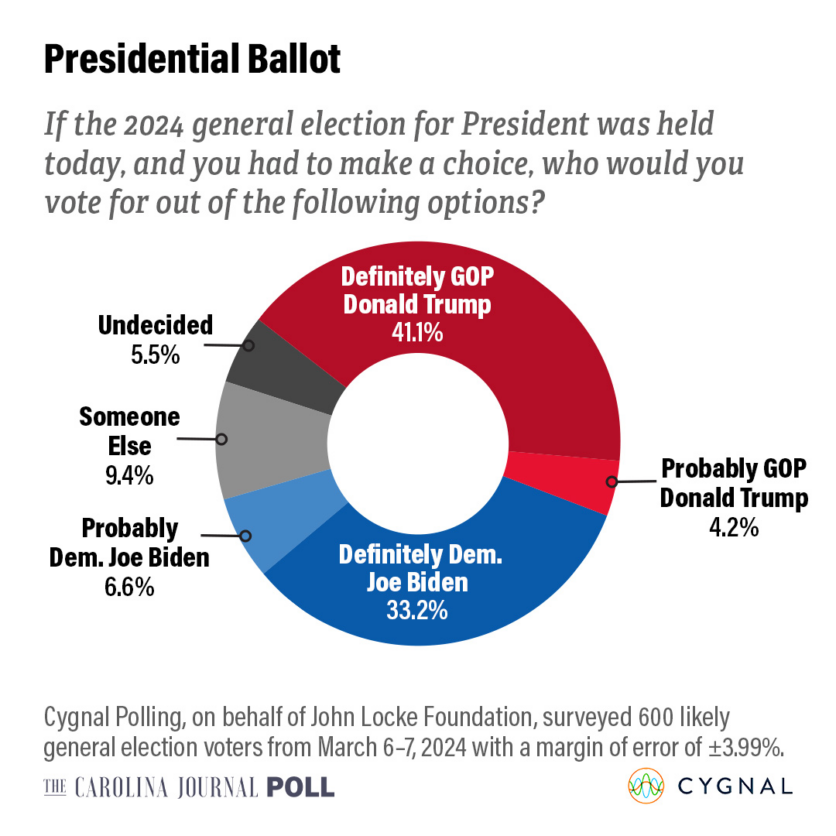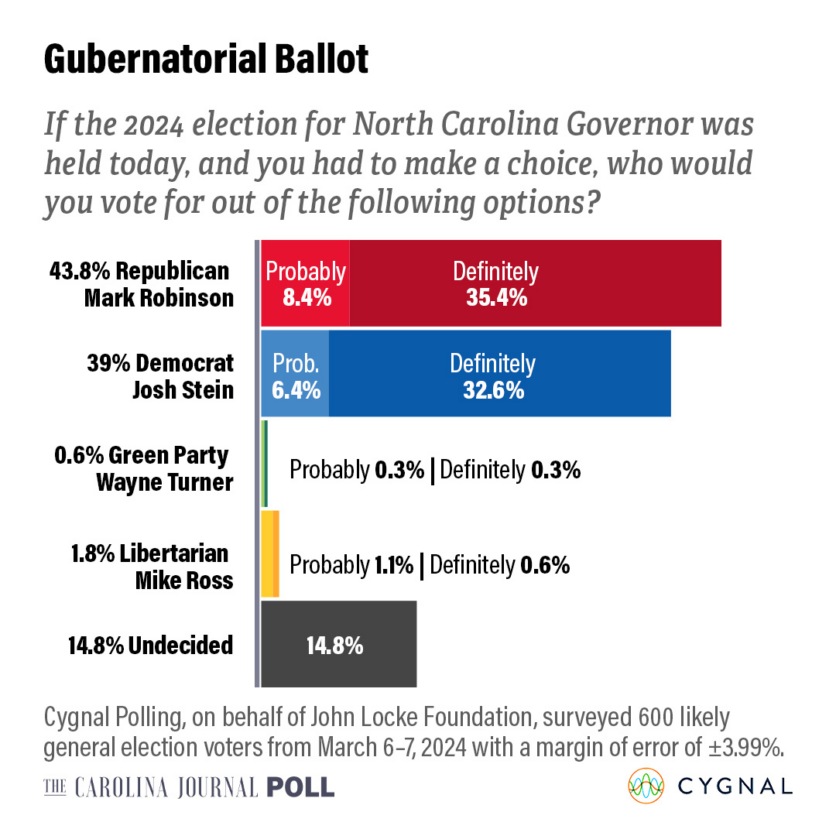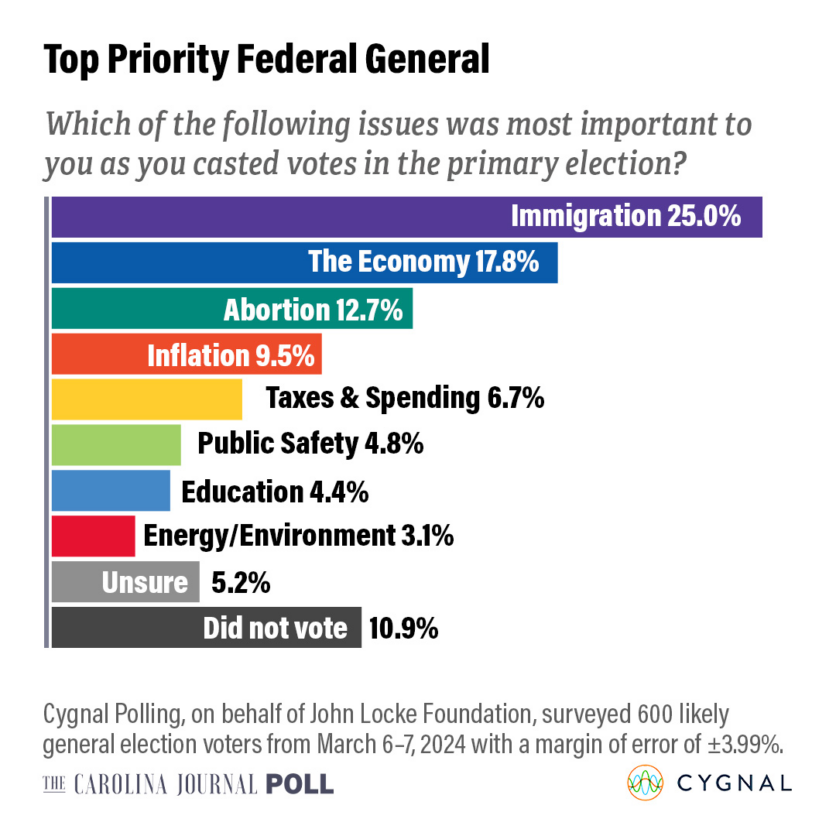March 12, 2024
RALEIGH – Once again, voters will find themselves choosing between President Joe Biden and former President Donald Trump to take the White House in November. While the winners of this month’s primaries include many familiar faces, they also included some surprising upsets by political newcomers. This month’s Carolina Journal poll went in the field promptly after Super Tuesday to get a sense of voters’ post-election sentiments and early insights into who voters are favoring for the general election.
In the presidential race, Donald Trump holds a 5.4-point lead over incumbent Joe Biden. A plurality of likely voters (45.2%) said they are planning to vote for Trump, while 39.8% said they plan to vote for Biden. A significant minority (9.4%) said they plan to vote for “someone else.” Which, if it holds true, would indicate a marked increase in third-party votes cast in the general election. In 2020, less than 1.5% of North Carolina votes were cast for a candidate other than Biden or Trump.
“Trump’s lead is somewhat unsurprising given that he won the state in 2016 and 2020, by 3.6% and 1.3%, respectively. However, it’s still 238 days to November 5 and we’ll be watching to see how this fluctuates,” said Carolina Journal publisher and John Locke Foundation CEO Donald Bryson. “Both Josh Stein and Mark Robinson have shown the ability to win statewide races and raise money – the race for the Executive Mansion is the one to watch in North Carolina.”
Republican Lt. Governor Mark Robinson has a similarly sized lead over Democratic Attorney General Josh Stein in the gubernatorial race. A plurality of voters said they plan to vote for Robinson (43.8%), a 4.8-point lead over Stein (39.0%). A majority of rural voters (53%) said they intend to vote for Robinson, while Stein has the support of a plurality of suburban and urban voters (46% and 47%, respectively).
Immigration came out as the most influential issue when voters were asked to choose the top concern guiding their ballot decisions. A quarter of voters said immigration was their most important issue, followed by the economy (17.8%), abortion (12.7%), and inflation (9.5%). College-educated women were most likely to cite abortion as their primary concern, while individuals with a technical degree were most likely to cite immigration.
Republicans are gaining ground in a hypothetical generic congressional race. When asked which party they would likely vote for, 48.3% of voters said they would choose a Republican congressional candidate, while 42.5% said they would vote for a Democratic congressional candidate. This widens the GOP’s lead in this race from less than 3 points in November 2023 to nearly 6 points post-primary election.
This increased support for Republican candidates was evident in every race polled. Republicans have the greatest leads in the races for State Insurance Commissioner and Labor Commissioner. Incumbent Republican Mike Causey has a 6.7-point lead over Democratic candidate Natasha Marcus (43.4% and 36.7%, respectively). Luke Farley (41.7%), a Republican and endorsed by former Labor Commissioner Cherie Berry, as well is leading Democratic candidate Braxton Winston (35%) by 6.7 points. The GOP has a smaller, but still significant, lead in the state Treasurer race with Republican Brad Briner (42.8%) 5.4 points ahead of Democrat Wesley Harris (37.4%).
Republicans are also ahead by ~2 points in the races for Attorney General, Supreme Court, and state Superintendent, but these leads are within the poll’s ±3.99% margin of error. A plurality of voters (40.6%) said they would vote for Congressman Dan Bishop, while 38.5% of voters said they would vote for Congressman Jeff Jackson. Newcomer Republican Michele Morrow (40.8%) holds a similar lead over Democrat Maurice “Mo” Green (39.1%). In the state Supreme Court race, Republican State Appeals Court Judge Jefferson Griffin (41.4%) leads Democrat Supreme Court Associate Justice Allison Riggs (39.4%).
“Superintendent Catherine Truitt’s primary election loss and four open seats make 2024 a volatile year for the North Carolina Council of State,” Bryson said. “Aside from the drama of these individual races, there is also the question of whether Republicans can maintain their majority on the Council, which also makes policy decisions.”
A majority of voters (59.7%) say they are satisfied with the results of the March 5 primaries. However, 3-out-of-10 voters said they were dissatisfied with their choices of candidates for the general election. Fewer voters, however, are satisfied with how the country and the state are being run. President Joe Biden’s approval rating remains underwater, with 58.9% of voters disapproving of the job he is doing in office – compared to just 37.5% of voters approving. Voters are even more pessimistic about the direction of the country, with only around a quarter of voters believing the United States is on the right track. The approval rating of Governor Roy Cooper is notably higher than it was in November – 48.9% compared to 44.4%. This is the highest approval rating Cooper has had in over 2 years.


